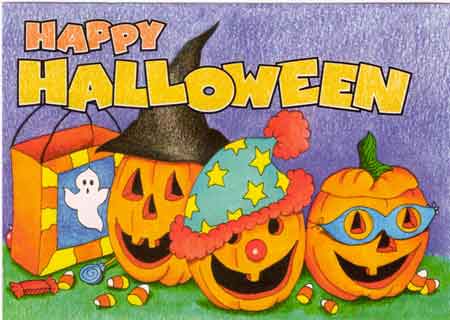Halloween
Halloween (also spelled Hallowe'en) is an annual holiday celebrated on October 31. It has roots in the Celtic festival of Samhain and the Christian holy day of All Saints. It is largely a secular celebration but some have expressed strong feelings about perceived religious overtones.
The day is often associated with the colors black and orange, and is strongly associated with symbols like the jack-o'-lantern. Halloween activities include trick-or-treating, wearing costumes and attending costume parties, ghost tours, bonfires, visiting haunted attractions, pranks, telling scary stories, and watching horror films.

History
Halloween has origins in the ancient festival known as Samhain (pronounced sow-in or sau-an),which is derived from Old Irish and means roughly "summer's end".This was a Gaelic festival celebrated mainly in Ireland and Scotland. However, similar festivals were held by other Celts – for example the festival of Calan Gaeaf (pronounced kalan-geyf) which was held by the ancient Britons.
The festival of Samhain celebrates the end of the "lighter half" of the year and beginning of the "darker half", and is sometimes regarded as the "Celtic New Year".
The celebration has some elements of a festival of the dead. The ancient Celts believed that the border between this world and the Otherworld became thin on Samhain, allowing spirits (both harmless and harmful) to pass through. The family's ancestors were honoured and invited home whilst harmful spirits were warded off. It is believed that the need to ward off harmful spirits led to the wearing of costumes and masks. Their purpose was to disguise oneself as a harmful spirit and thus avoid harm. In Scotland the spirits were impersonated by young men dressed in white with masked, veiled or blackened faces. Samhain was also a time to take stock of food supplies and slaughter livestock for winter stores. Bonfires played a large part in the festivities. All other fires were doused and each home lit their hearth from the bonfire. The bones of slaughtered livestock were cast into its flames. Sometimes two bonfires would be built side-by-side, and people and their livestock would walk between them as a cleansing ritual.
Another common practise was divination, which often involved the use of food and drink.
The name Halloween and many present-day traditions, derive from the Old English era.
Origin of name
The term Halloween, originally spelled Hallowe’en, is shortened from All Hallows' Even – e'en is a shortening of even, which is a shortening of evening. This is ultimately derived from the Old English Eallra Hālgena ?fen.It is now known as "Eve of" All Saints' Day, which is November 1st.
A time of pagan festivities, Popes Gregory III (731–741) and Gregory IV (827–844) tried to supplant it with the Christian holiday (All Saints' Day) by moving it from May 13 to November 1.
In the 800s, the Church measured the day as starting at sunset, in accordance with the Florentine calendar. Although All Saints' Day is now considered to occur one day after Halloween, the two holidays were once celebrated on the same day.
Trick-or-treating and guising
Trick-or-treating is a customary celebration for children on Halloween. Children go in costume from house to house, asking for treats such as candy or sometimes money, with the question, "Trick or treat?" The word "trick" refers to a (mostly idle) threat to perform mischief on the homeowners or their property if no treat is given. In some parts of Ireland and Scotland children still go guising. In this custom the child performs some sort of show, i.e. sings a song or tells a ghost story, in order to earn their treats.
Games and other activities
There are several games traditionally associated with Halloween parties. One common game is dunking or apple bobbing, in which apples float in a tub or a large basin of water and the participants must use their teeth to remove an apple from the basin.A variant of dunking involves kneeling on a chair, holding a fork between the teeth and trying to drop the fork into an apple[28]. Another common game involves hanging up treacle or syrup-coated scones by strings; these must be eaten without using hands while they remain attached to the string, an activity that inevitably leads to a very sticky face.
Some games traditionally played at Halloween are forms of divination. A traditional Irish and Scottish form of divining one's future spouse is to carve an apple in one long strip, then toss the peel over one's shoulder. The peel is believed to land in the shape of the first letter of the future spouse's name. Unmarried women were told that if they sat in a darkened room and gazed into a mirror on Halloween night, the face of their future husband would appear in the mirror. However, if they were destined to die before marriage, a skull would appear. The custom was widespread enough to be commemorated on greeting cards from the late 19th and early 20th centuries.
The telling of ghost stories and viewing of horror films are common fixtures of Halloween parties. Episodes of TV series and specials with Halloween themes (with the specials usually aimed at children) are commonly aired on or before the holiday, while new horror films, are often released theatrically before the holiday to take advantage of the atmosphere.
(Source: wikipedia.org, 英語點津Julie編輯)